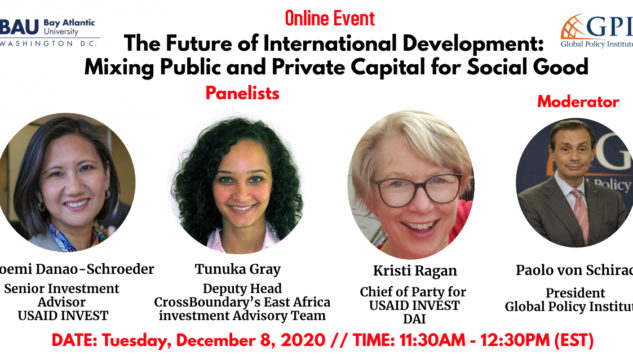Events

The Future of International Development: Mixing Public and Private Capital for Social Good
It is possible now to create a true multiplier effect combining financing from traditional donors with the considerable resources from the private sector in order to boost economic growth in emerging markets. In order to achieve results at scale it is important to understand the role that the private sector is playing in international development. Donors are providing transaction support to facilitate new private sector investment as part of a growing international development approach that will help deliver more jobs and innovation in emerging markets. There are already important success stories of facilitating private sector investment in agriculture, health, and women-owned enterprises in Africa, Asia, and Latin America.
Ragan explained the meaning of blended finance. She added that donor funding aimed at mobilizing private investments is not just the new passing fad in international development. It is here to stay, simply because Official Development Assistance, while not negligible, will never be enough to fund the trillions of dollars of investments necessary to achieve the Sustainable development Goals. Hence the need to engage productively the private sector. One of the key efforts in this new space is a large USAID project called INVEST. Under the label of USAID INVEST, US Government funds are utilized to pay for services offered by companies that will identify business opportunities and then bring private sector investors to the table. She added that lack of knowledge of these new instruments is one of the key challenges that have kept donors from mobilizing private investment in the past.
Danao-Schroeder explained the meaning of gender lens investing. This is about prioritizing investment projects led by women. It is about providing tools that will enable women-led enterprises to launch/grow their projects, even when the conventional guarantees normally requested by commercial credit institutions are lacking. Donor money is being used to drive more investment into women owned and managed companies. She also illustrated an unconventional intervention in Italy, a country not normally covered by foreign aid programs. USAID is currently working with Italian private sector partners to fashion a response to Covid, by adding capacity in the production of medical equipment needed by the Italian health sector. The project is about enabling these Italian companies, some of them small and not well funded, to grow following best practices, so that they will be able to meet the demands of this project. Gray described the Africa-based company she works for, called CrossBoundary. Its mission is to work all across Africa on mobilizing investments. They work with potential investors as well as with companies seeking investors, so that ideas are soon transformed into bankable or investor-ready projects. CrossBoundary is involved in a number of economic sectors, including small size solar projects in Kenya. While there are major challenges in getting projects going in countries in which the overall climate is often not business friendly, CrossBoundary can help the various players deal with the legal and administrative challenges.
Ragan pointed out why donor funding is important to help on transaction support. In many cases, even a modest capital commitment pledged by USAID can help mobilize much bigger amounts of private capital. From this perspective, USAID’s role has a true “force multiplier” effect, giving credibility and visibility to projects and therefore creating the opportunity for obtaining additional funding. Danao-Schroeder explained how the model adopted in setting up and executing the covid related project in Italy could be adopted as a template for other projects, involving different sectors, in other countries. Gray pointed out that there is considerable pent-up demand for energy related projects in Africa. Solutions based on renewable energy technology offer great opportunities for international investors.